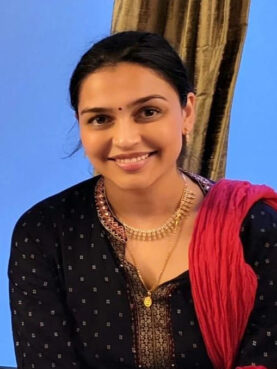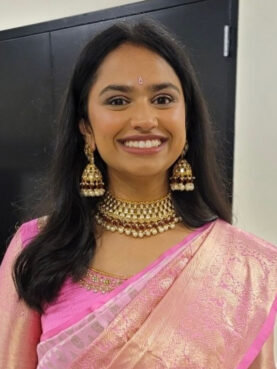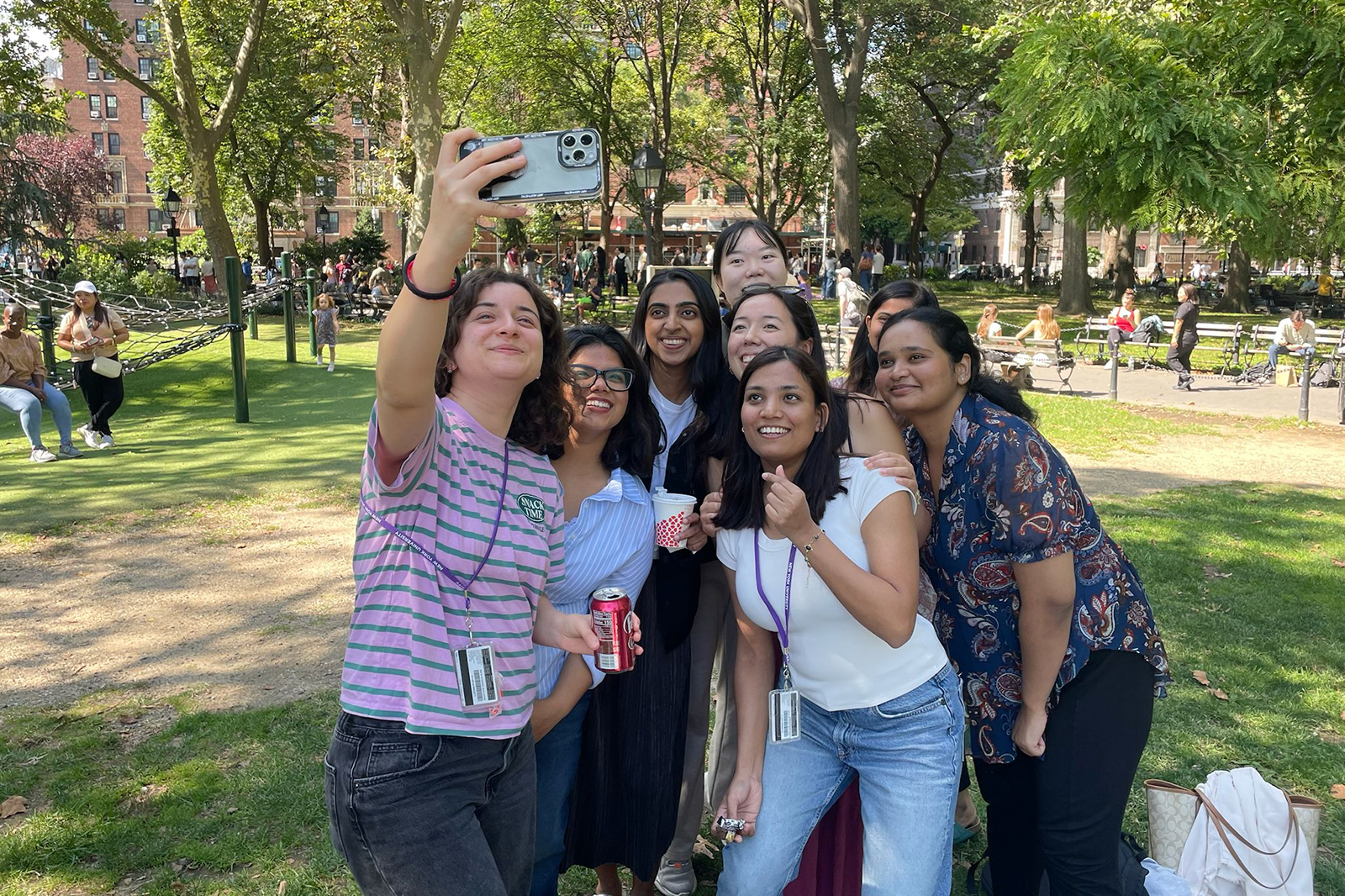
(RNS) — Law school’s notorious stress takes a toll on even the most determined students. But for a group of 20-somethings at New York University School of Law, an ancient tradition offers a framework for handling the pressure.
“Many parts of Hinduism are so well-suited to being able to handle such a high-stress profession,” said Roshni Yaradi, the co-chair of the new Hindu Law Students Association. “Like, many times, you’re handling literal life and death.
“Practices of Hinduism — including yoga, meditation, breath work — things that are so fundamental to the faith, are very stress-relieving and focusing techniques that I think any practicing lawyer should utilize.”
Yaradi and three other women, all Indian American, are the founding members of the only Hindu affinity group at any law school in the nation. HLSA officially started last spring, after taking some time to gain traction and the necessary 50 approval signatures.
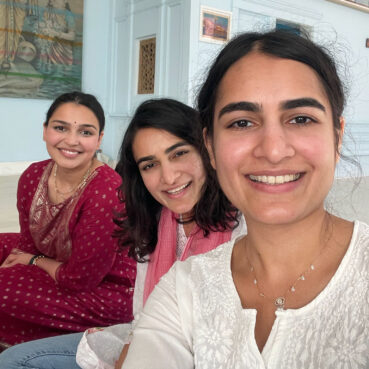
Roshni Yaradi, from left, Tanya Bansal, and Megha Bansal at Broome Street Ganesha Temple in New York City. (Courtesy photo)
“If every other religious group has an organization at NYU Law, why don’t we?” thought Rachita Bommakanti, a fellow second-year student and Yaradi’s co-chair.
Indian students are the second-highest population of international students at NYU, after those from China, with more than 4,700 undergraduate and graduate students coming from India to study at NYU in the 2023-2024 academic school year.
“I think it’s a little bit of a reclamation project for us,” said Bommakanti, who hopes the HLSA will help grad-school-age Hindus, from India or the U.S., reconnect with their faith — and its resources for succeeding in the legal profession — while studying in the city.
In their younger years, Yaradi and Bommakanti, both from the DC-Maryland-Virginia area, felt reluctant to join existing Hindu student groups: partially due to what they said was a less developed relationship with their own faith, and partially due to the “very real insecurity” of being a proud, visible Hindu in the country — which is the reason, they say, most young Hindu Americans identify with the cultural, but not necessarily the religious, aspects of Hinduism. (“Diwali parties without the puja (prayer ritual),” Yaradi offered by way of example.)
The co-chairs also felt that not enough spaces emphasized the diversity of perspectives in Hinduism, often because they were tied to a specific Hindu sect or lineage.
“It was, like, really rigid, or there was less room for dissent,” said Bommakanti, who describes herself as being drawn more to the philosophy of Hinduism than to its ritualistic aspects. “Which is funny, right? Because the whole point is that we are dissenting individuals.”
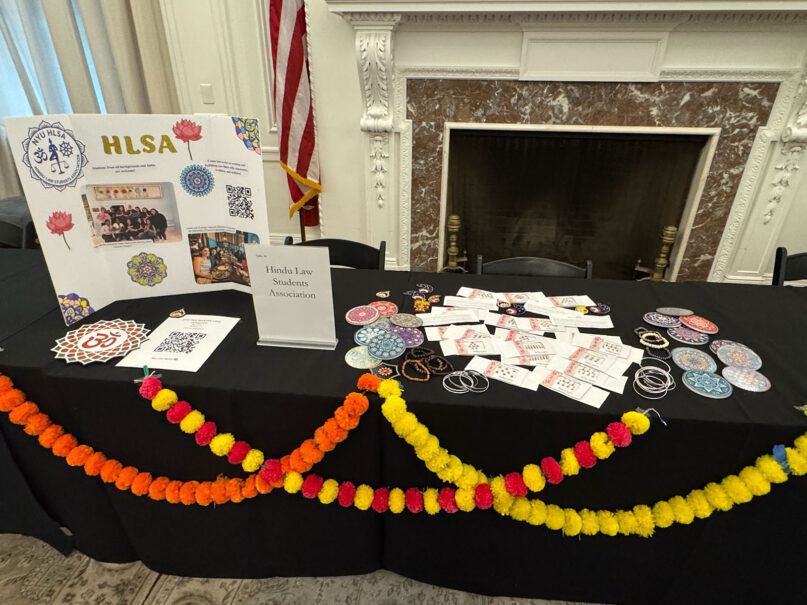
The Hindu Law Students Association at a New York University student group fair. (Courtesy photo)
In these young women’s eyes, HLSA is not meant to be the largest Hindu student organization in the nation, but a specially meaningful one, in which anyone feels welcome to discuss their differing opinions, values, practices and experiences with the Hindu faith.
But the real project, they say, is changing the perception of what Hinduism can be for a young American. “You can be a Hindu and be cool,” said Yaradi. “You can be a Hindu and interpret it in a way that you eat meat, and you can interpret it in a way that you don’t eat meat. You can interpret it in a way that you do or don’t drink.”
Bommakanti continued, “Whatever impediment people feel to exercising Hinduism that is caused by this idea that, like, ‘I’m going to be weird,’ or ‘I’m not going to be normal,’ I want to abolish that.
“All it takes is just to see one person being cool and a proud Hindu, and then you’re like, ‘Oh, well, maybe I can do that too,'” she said.
The group of about 30 students — most of them part of the one-year Masters of Law program, with a few in the full three-year JD program — has thus far held a yoga class at SoHo’s Broome Street Ganesha Temple and a discussion about Indic spirituality with New School professor Gabrielle Williams.
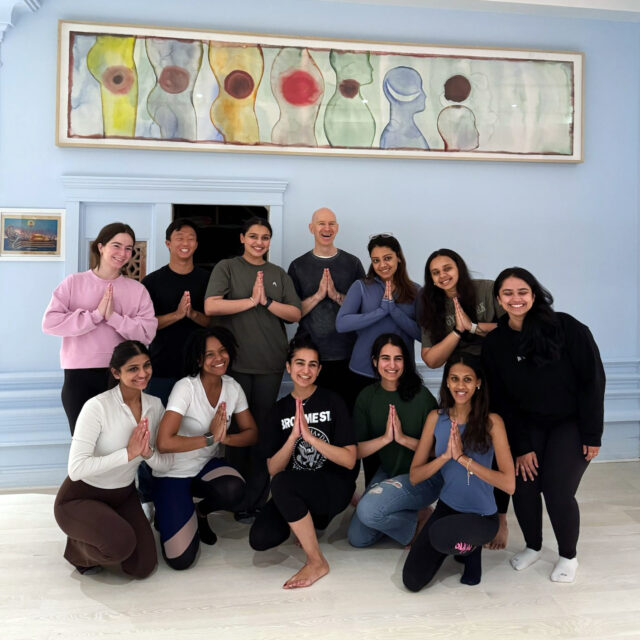
Hindu Law Students Association members pose together after practicing yoga at Broome Street Ganesha Temple in New York City. (Courtesy photo)
But the Hindu perspective is not limited to yoga practice and “golden lattes.” The Bhagavad Gita — the sacred Hindu text detailing Lord Krishna’s advice to warrior prince Arjuna in the midst of the Mahabharata war — has been a guiding light for these students studying the way of the law. Particularly, they say, a verse in Chapter Two in which Arjuna is preoccupied with the possible results of the war, rather than his dharma, or duty, in the present.
HLSA hopes to start weekly group Gita readings as members progress through demanding coursework and exams, as well as their future cases as attorneys.
“Krishna tells Arjuna to focus on what you do and do it to the best of your ability, and then, like, leave it there,” said Yaradi, “and what is meant to happen is going to happen. That is an incredibly valuable perspective, to just have faith that things will work out, while also prioritizing doing your duty, which is to work hard.”
“So much of the law is about the fruit of your action, right?” added Bommakanti. “And the attachment to that fruit, I feel like, is ultimately what leads people to burnout and dissatisfaction. It’s such a simple principle, but such an enduring one.”
For their own dharma, the students hope creating this club will open the doors for other students to take the initiative at their universities — no matter their own journey with Hinduism. And hopefully, they say, being more “openly Hindu” will inspire existing Hindu lawyers and other professionals to share how their faith intersects with their job.
“Hinduism is so beautiful because if you want to do the work — if you want to read, if you want to think, if you want to have conversations — you don’t have to be old to be learned,” said Bommakanti. “I don’t have to be like, some monk or something, to chair this organization. I can just be someone who’s looking for answers.”
The group kicked off the school year last week with a welcome picnic, and the co-chairs say they hope to soon host Hindu traditional dance workshops, trips to Queens temples and holiday celebrations, making sure, Yaradi said, to “tie the religious and cultural aspects of Hinduism back together.”

